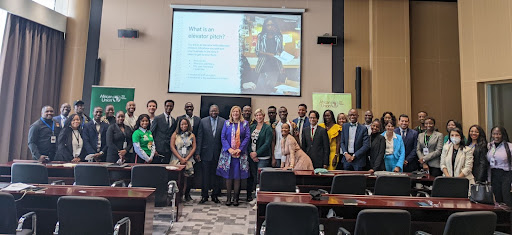Editor’s note: H.E Albert Muchanga, African Union Commissioner for Economic Development, Trade, Tourism, Industry, and Minerals, contributed today's piece. He writes about a new relationship between the African Union Commission and Google aimed at supporting small enterprises and youth-led startups across the continent.
----
AU Commissioner Albert Muchanga and Google Government Affairs & Public Policy Director for Sub-Saharan Africa Charles Murito signing an agreement of collaboration
A dynamic SMB and startup landscape drive the tech ecosystem in Africa and entrepreneurship is a key driver of economic growth. Across the continent, small and medium businesses (SMBs) can comprise roughly 80% of the workforce. In Nigeria and Kenya for example, SMBs contribute to 84% of all local jobs and in South Africa, SMBs contribute to 52% of the country's GDP. In 2021, startups raised over $4 billion and they employed over half of Africa’s software developers. Simply put, these startups and SMBs are the backbone of African economies. They are resolving some of Africa's most pressing challenges, including the inability of isolated communities to access healthcare, the lack of work prospects for women, and the ability to securely send and receive money. These entrepreneurs and startups have the potential to expand the African internet economy to $180 billion by opening up opportunities to reach new customers via e-commerce with better access to technology and digital training.
Last week, at the AU Private Sector Forum, government officials, civil society experts, and private sector representatives focused on establishing meaningful ways to support youth, given that Africa has the world’s youngest, fastest-growing, and most urbanized workforce. Africa will be home to one-third of the world's young (aged 15 to 35) by 2050. The future of the world’s workforce will clearly come from Africa, and we are pleased that our collaboration with Google is enabling us to better support them.
Youth entrepreneurs and women-led firms were given a master class on how to effectively present their creative business concepts in order to get investment. A startup pitch competition to uncover Africa's Next Unicorn (a company valued at $1 billion) was also conducted.
Photo of the youth and women-led SMB participants in Google’s Masterclass.
Moving beyond the Forum, the collaboration with Google will allow youth-led startups and small and medium enterprises across Africa to identify new markets, bring their businesses online, access financing opportunities, and pitch for success through programs such as the Hustle Academy and the Google for Startups Accelerator program.
In 2017, Google launched its Grow with Google initiative with a commitment to train 10 million young Africans and small businesses in digital skills. To date, Google has trained over 6 million people across 25 African countries, with over 60% of participants experiencing growth in their career and/or business as a result. Our hope is that this collaboration with the African Union will help to expand the reach of these programs to the 55 member states.
From a policy perspective, robust collaboration between the private and public sectors is critical to ensuring that African entrepreneurs thrive, not only in our home countries and regions, but in the global marketplace. This is why we are also working together with Google to develop policies, such as national startup and SMB legislation, to create a regulatory environment that will sustain economic growth by turning African countries into Digital Sprinters and advance Agenda 2063 aspirations to create the Africa we want.

